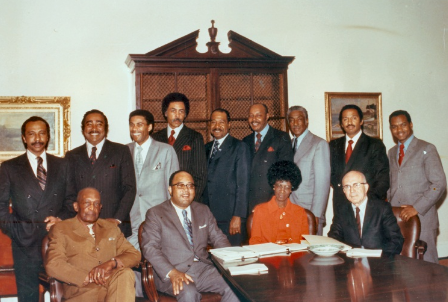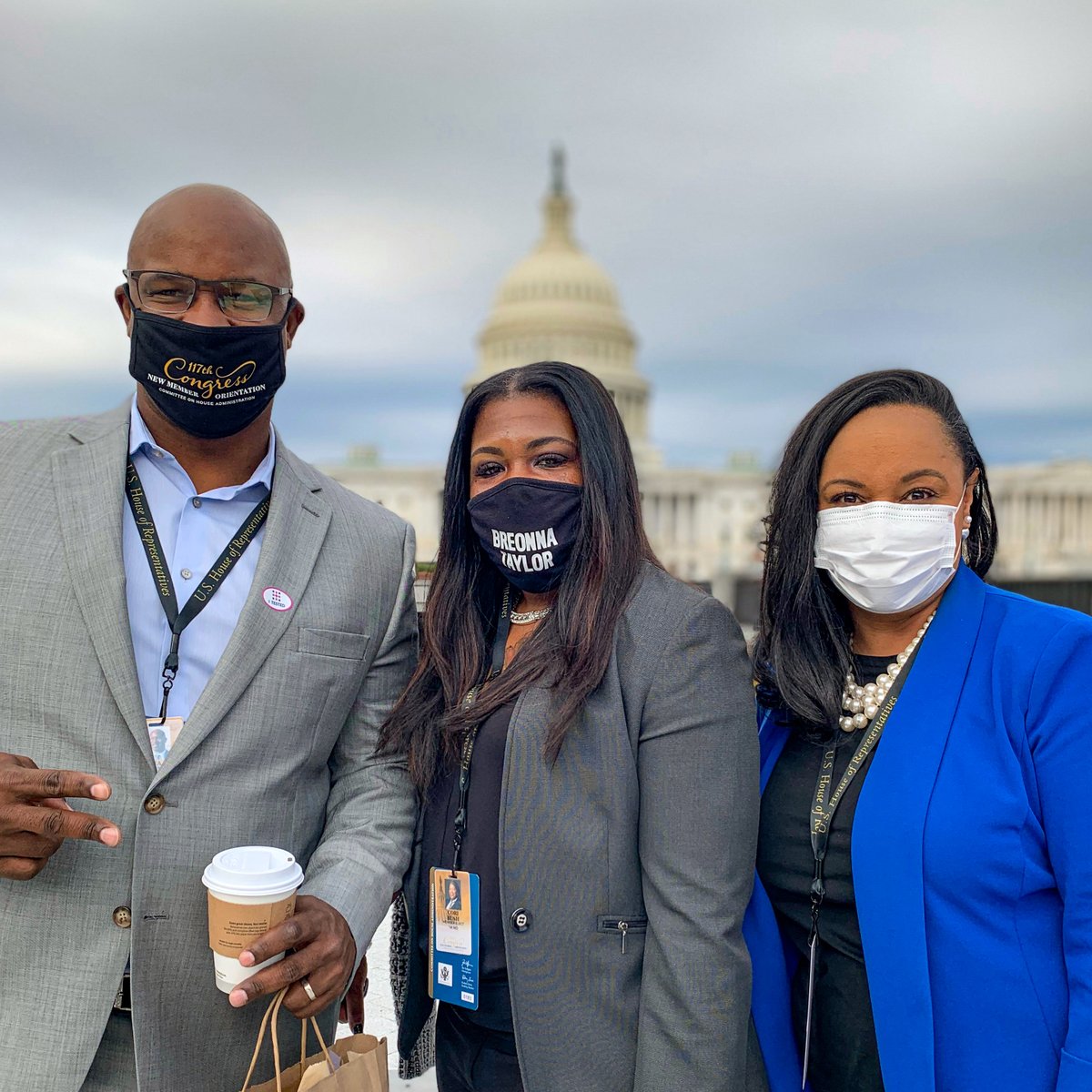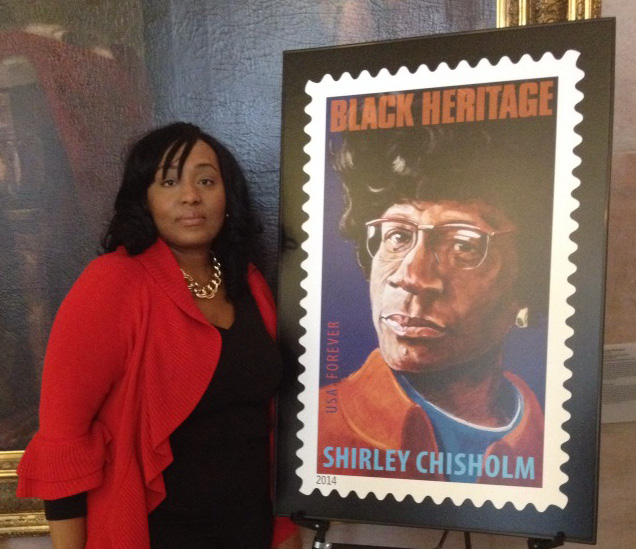
In February of 1971, Congresswoman Shirley Chisholm joined 12 other Black U.S. Representatives as a founding member of the Congressional Black Caucus (CBC). The Black Caucus began as an informal alliance of African-American lawmakers, which coalesced into a formal organization. By combining their power, these founders sought to increase their influence on behalf of the profoundly marginalized Black population. Only thirteen representatives (and one Senator) had been elected to serve over 22 million Black people. Of the other ninety-nine Senators and 422 Representatives, almost all them were white and male.

When Chisholm declared her intentions to run for the US-presidency in 1972, she received little substantive support from the Black Caucus. Of the founding members, only Rep. Parren Mitchell openly supported her. Ron Dellums, a progressive and admirer of Chisholm before he became a Congressman, was also a key Chisholm supporter—until the Democratic National Convention that year when he joined the rest of the Caucus in promoting George McGovern’s candidacy. The Black Caucus supported McGovern publicly despite private doubts about whether he would be a reliable advocate for the Black population.
Although Chisholm was not supported by the Black Caucus (or the leaders by the mainstream feminist movement) in the 1972 presidential campaign, her candidacy led to the election of a number of future members of the CBC. Future Congresswomen Barbara Lee and Maxine Waters of California both entered politics as organizers in Chisholm’s campaign. Many other Congresswomen, including Rep. Sheila Jackson Lee, credit Chisholm as inspirations.
50 yrs ago, Shirley Chisholm began her service as the first Black woman in Congress.
She was often frozen out by men and alienated by the feminist movement.
Chisholm's courage helped create a pathway for the 20 Black women in Congress today. pic.twitter.com/rVNvNEI7sw
— Sheila Jackson Lee (@JacksonLeeTX18) July 8, 2019
On this historic day, I’m wearing Congresswoman Shirley Chisholm’s pearls, given to me by her goddaughter, who said that her godmother “would not want it any other way.”
Because of Shirley Chisholm, I am.
Because of Shirley Chisholm, Vice President Harris is. pic.twitter.com/rgQKw2Y8Qb
— Rep. Barbara Lee (@RepBarbaraLee) January 20, 2021
Chisholm’s career in Congress and her presidential run are directly attributable to the growth of the CBC since its founding—and the number of Black Congressional Women. In 2018, the Congressional Black Caucus had grown to 50+ members, including new congresswomen like Lauren Underwood, Lucy McBath, Jahana Hayes, Ilhan Omar and Ayanna Pressley who credit Chisholm as helping to pave their way.
Because of her. pic.twitter.com/6QTXadxdON
— Ayanna Pressley (@AyannaPressley) November 16, 2018
Unbought. Unbossed. Today, the first day of #BlackHistoryMonth, I'd like to send a little love to two heroines—one from our past, Shirley Chisholm, and one from our present. See you Tuesday, Ms. Abrams. pic.twitter.com/AqRBMtJGgz
— Lauren Underwood (@LaurenUnderwood) February 1, 2019
Shirley Chisholm — the first Black woman in Congress, and the first woman and African American of a major party to run for president — is the reason millions have SNAP benefits, and why Black women, who were told to wait our turn, have a voice in Congress now. #BlackHistoryMonth pic.twitter.com/4Y0vFtXctv
— Ilhan Omar (@IlhanMN) February 12, 2020

After the 2020 election, four new leaders have joined the CBC as Frmr. Senator Kamala Harris joins the Biden administration as VP. They are: Rep. Cori Bush (who unseated veteran Lacy Clay); Rep. Jamaal Bowman; Rep. Nikema Williams (who replaced the late John Lewis) & Sen. Raphael Warnock. Warnock, along with Frmr. Senators Obama, Carol Mosely Braun and Kamala Harris, has joined his House colleagues on the CBC
The Black Caucus has come a long way from its original 13 members in the 70’s. But, the struggle to translate its growing numbers into policy transformation in favor of marginalized Black populations, continues. Many of Chisholm’s political successors have followed her example in articulating bold policy changes. If the newly-expanded Congressional Black Caucus succeeds in pushing the legislature and President Biden to address ongoing racism against the Black population, we have Shirley Chisholm to thank for those achievements.
Thank you for showing us the way. https://t.co/zABh45LrnM
— Jamaal Bowman (@JamaalBowmanNY) November 5, 2020
Squad up. pic.twitter.com/bp2KATL22R
— Cori Bush (@CoriBush) January 3, 2021
This Black History Month, we should ask this question: where would the Congressional Black Caucus be today—in its numbers and in its impact— if it were not for the Honorable Shirley Chisholm?
 Dr. Zinga A. Fraser, Director of the Shirley Chisholm Project, who served as a Congressional Aide to Congressman Major Owens, is the Director of the Chisholm Project, an expert on Shirley Chisholm and the history of Black Congressional politics. Her upcoming book Sister Insider/ Sister Outsider: Shirley Chisholm and Barbara Jordan Black Women’s Politics in the Post-Civil Rights Era will take an in-depth look at how Black Women in Congress have sought to reshape American Democracy.
Dr. Zinga A. Fraser, Director of the Shirley Chisholm Project, who served as a Congressional Aide to Congressman Major Owens, is the Director of the Chisholm Project, an expert on Shirley Chisholm and the history of Black Congressional politics. Her upcoming book Sister Insider/ Sister Outsider: Shirley Chisholm and Barbara Jordan Black Women’s Politics in the Post-Civil Rights Era will take an in-depth look at how Black Women in Congress have sought to reshape American Democracy.